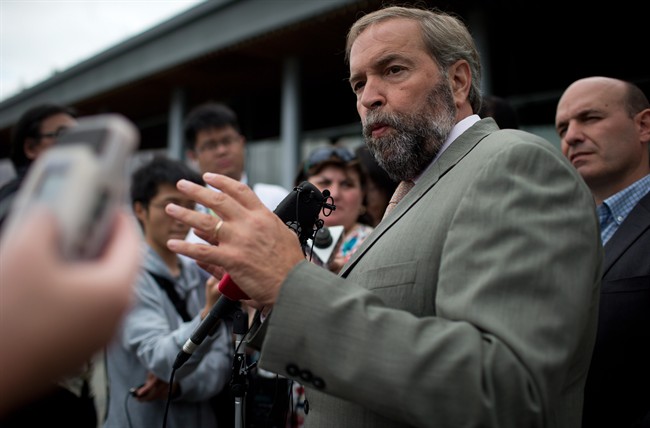VANCOUVER – Touring the Douglas Channel on British Columbia’s North Coast has convinced federal Opposition Leader Thomas Mulcair it would be “pure madness” to allow supertankers carrying raw bitumen to ply the narrow passage.

The New Democratic Party leader said Tuesday the planned route for exporting oil to Asia “makes no sense,” and that’s why his party would introduce legislation barring the transport option if it was in power.
“It’s not just a question of personal opinion,” Mulcair told reporters in Vancouver after spending the previous day in the region to the north.
“We’d set out clear criteria that would make sure a supertanker would no longer be allowed along that pristine coast.”
The 90-kilometre-long Douglas Channel links the Pacific Ocean to the District of Kitimat, the would-be terminus of the controversial Northern Gateway oil pipeline.
The project would see hundreds of tankers a year ply the channel carrying bitumen from the Alberta oilsands.
Mulcair met Monday with officials from Kitimat and with leaders of the Haisla First Nation and Gitga’at Nation of Hartley Bay.
Asked about the landmark Supreme Court of Canada decision last month that granted aboriginal title for the first time to the Tsilhqot’in Nation who live in B.C.’s Interior, Mulcair said an NDP government would establish a “nation-to-nation” relationship with First Nations.
Respecting First Nations’ inherent rights, treaty rights and Canada’s international obligations is not only “the right thing to do legally, but the smart thing to do economically,” he said.
There have been about 120 court rulings that show aboriginal rights are not being respected, he said.
“If you don’t get it right with regard to first Nations, a lot of development projects in this country will not go through.
“We’ve got to start listening to the courts instead of fighting with them.”
- Three B.C. men fined, banned from hunting after killing pregnant deer
- B.C. child-killer’s attempt to keep new identity secret draws widespread outrage
- Inquest hears B.C. hostage was lying on her captor before fatal shooting
- ‘We’ve had to make a 180’: What Oregonians say they got wrong with decriminalization



Comments